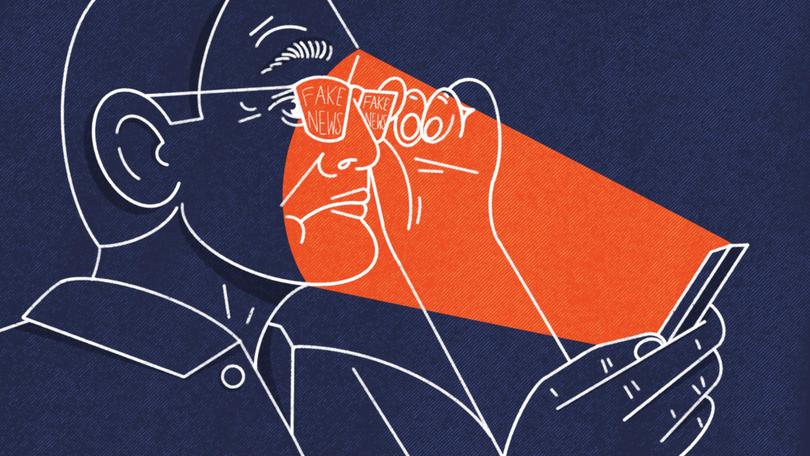JENI O’DOWD: The Albanese Government’s social media ban misses the point. It’s not just kids that are at risk
JENI O’DOWD: The Albanese Government’s inquiry into social media is nothing short of ironic. While we obsess over keeping kids off Instagram, we ignore the other victims of social media manipulation: adults.

The Albanese Government’s inquiry into social media is nothing short of ironic. While we obsess over keeping kids off Instagram and other social media apps, we ignore the other victims of social media manipulation: adults.
We all know kids are being exposed to inappropriate content or cyberbullying on social media, which is rightly concerning.
However, while the Government focuses on protecting children and teenagers, it has conveniently overlooked the dangers social media poses to adults, such as misinformation and political manipulation.
Sign up to The Nightly's newsletters.
Get the first look at the digital newspaper, curated daily stories and breaking headlines delivered to your inbox.
By continuing you agree to our Terms and Privacy Policy.Instead of only tackling issues like age restrictions and harmful content for teens, it should address the broader problem of how these platforms can shape public opinion and influence voter behaviour.
The Government has set up a Joint Parliamentary Select Committee to investigate social media’s impact on Australian society, which will deliver its final report next month.
While this inquiry was motivated by Meta’s recent decision to stop paying for news in Australia, it also aims to tackle issues like scams, age-restricted content, child sexual abuse, and violent extremist material.
Committee chair Sharon Claydon said: “The Government is focused on how Australians can be protected from the worst impacts of social media, and this inquiry is looking at what needs to change to ensure the online space is safe and secure for everyone.”
What’s alarming is the fundamental hypocrisy at play. While politicians express concern over social media’s impact on kids and the fact Meta should (quite rightly) pay for news content, they’ve conveniently ignored the platform’s powerful influence on voters.
Political parties exploit this influence during election campaigns to micro-target voters with tailored messaging and, in some cases, spread misleading or partisan content that manipulates public opinion.
Social media is undoubtedly a powerful tool for politicians. In the 2022 Federal election, social media platforms were used for hyper-targeted messaging, appealing to niche voter groups with tailored content.
A report by The Australia Institute found that in the final two months of the 2022 Federal election, political parties spent more than $12.5 million on Facebook and Instagram ads, with Labor spending at least $5 million, significantly more than the Coalition’s $3 million.
It said exit polls showed 73 per cent of voters saw misleading ads, highlighting the widespread use of misinformation.
And here’s the craziest thing: lying in political ads is perfectly legal in Australia.
Ebony Bennett, deputy director of the Australia Institute, says this fact underscores the need for truth in political advertising laws.
“Disturbingly, misinformation and disinformation were widespread during the election with 73 per cent of voters reporting exposure to misleading political advertising, and 43 per cent of those saying they saw this ‘once a day or more often’,” she said.
Remember businessman Clive Palmer in the 2019 Federal election? His party, United Australia Party, reportedly spent millions on Facebook ads, flooding the platform with ads to influence voter behaviour.
While the UAP did not win any seats, political analysts believe his heavy spending on social media ads likely impacted the campaign’s overall messaging and may have helped direct preferences towards the Liberal Party.
The 2019 election was the first to openly demonstrate social media’s real power in shaping narratives, mainly through targeted advertising and misinformation.
Both major political parties, like Palmer, used platforms like Facebook to micro-target ads, reaching voters with tailored messages based on their personal data and browsing habits.
These ads were often focused on specific demographics, including swinging voters in key electorates.
The Liberal Party used social media to promote negative ads against the Labor Party’s tax policies, mainly targeting older Australians worried about financial instability in retirement.
This was not the first election in which social media played a role. Still, it was pivotal in revealing how influential platforms like Facebook and Twitter can shape public opinion, highlighting the need for stronger regulation and oversight of social media’s role in democracy.
Of course, dirty tricks are nothing new in political campaigns — they have just moved from pamphlets and posters to social media.
When I edited Australia’s biggest newspaper, The Sunday Telegraph, more than 20 years ago, we always had plenty to fill the front page for the early edition on election days as there were always claims about dirty tricks at polling booths.
Nowadays, those dirty tricks have simply moved from the streets to social media, hidden behind sophisticated algorithms.
While political parties use social media to manipulate adult voters, the Government is also concerned about how these platforms affect younger Australians.
However, instead of addressing the bigger picture, they’re focusing on banning underage teens from social media platforms. This push to limit access for kids is gaining momentum, but how effective will it be?
The Government announced that underage teens will not face penalties for accessing social media once the pending age ban, which is likely to apply to those between 14 and 16 years old, is in place.
But is a ban even realistic? Anyone with a teenager knows how easily they can use someone else’s driver’s licence or other identification to pretend to be older than they are.
And just like gen X sneaking a drink from their parent’s liquor cabinet, today’s teens will make hiding apps on their phones a new rite of passage.
Instead of imposing ineffective bans, we should focus on equipping future generations with the knowledge to outsmart social media algorithms and the political forces trying to exploit them.
